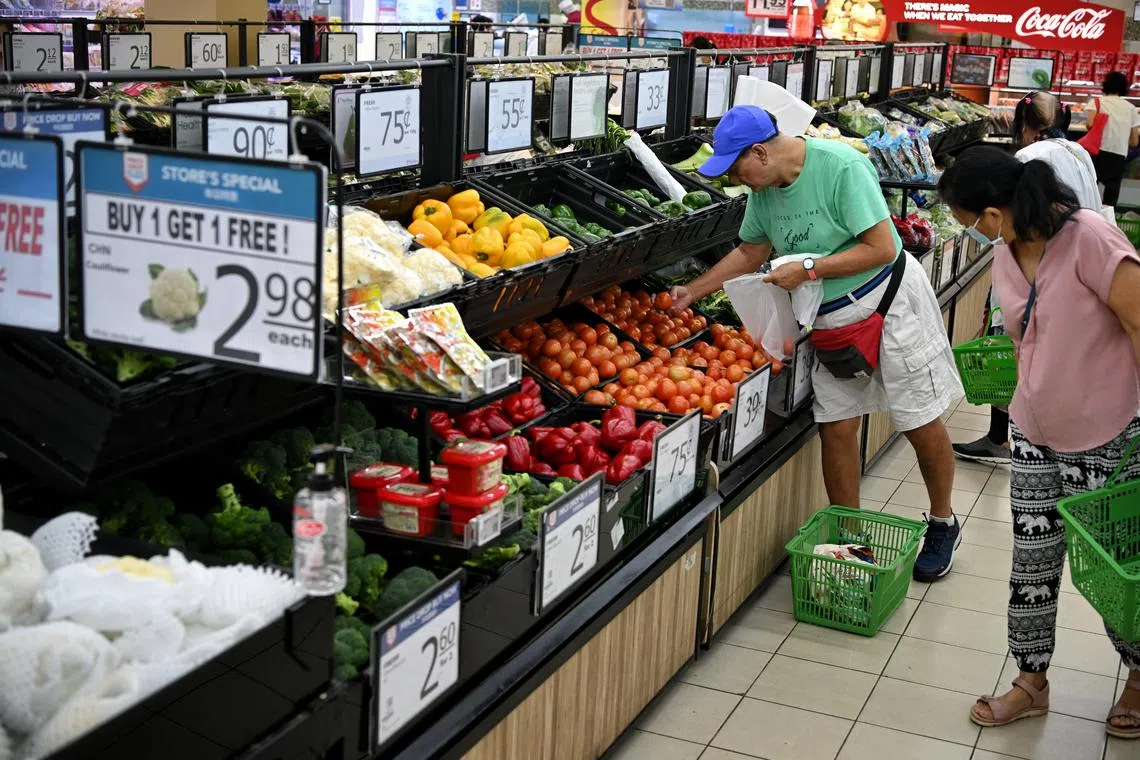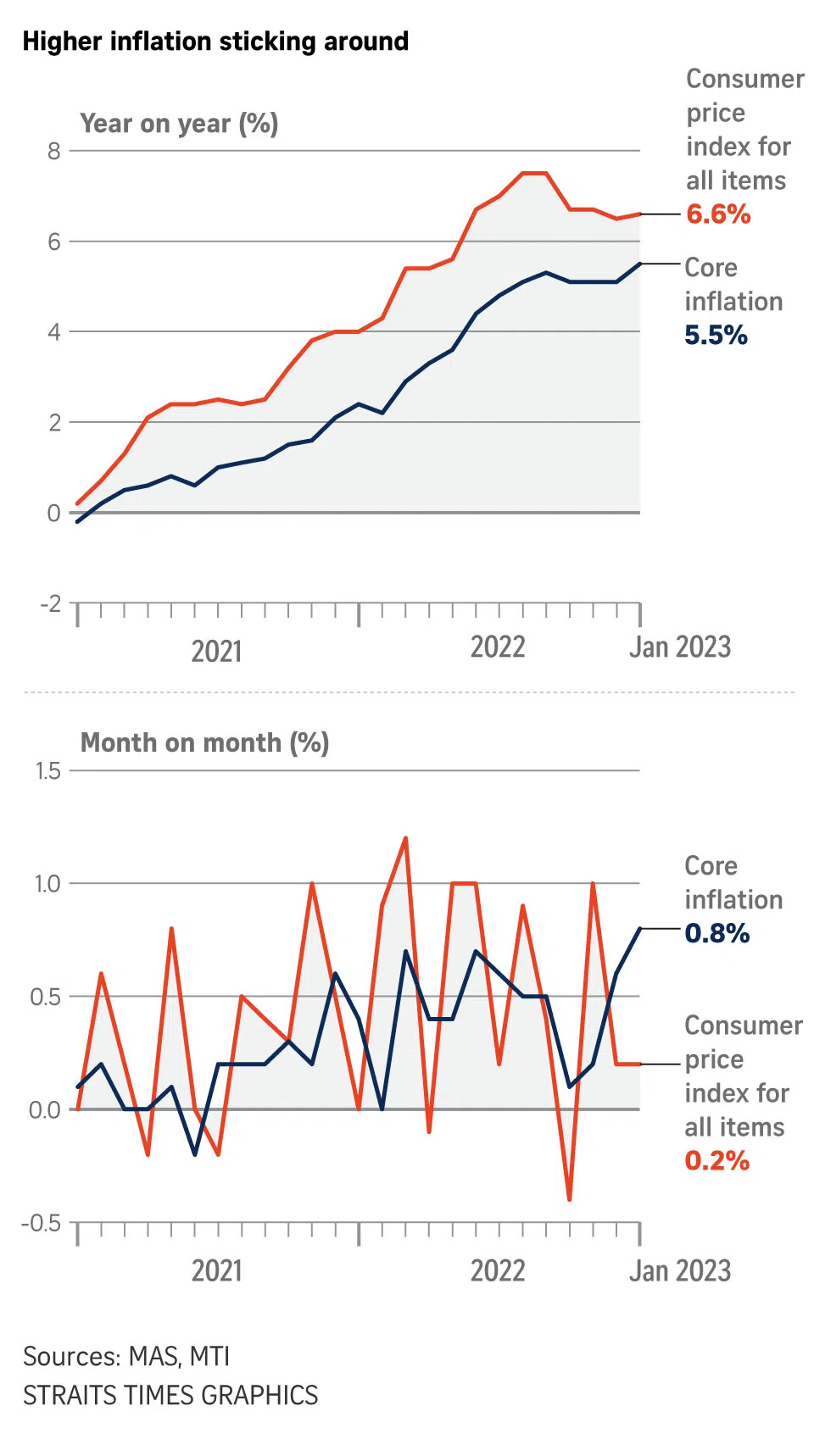Singapore core inflation rises to 5.5% in January, highest since November 2008
Sign up now: Get ST's newsletters delivered to your inbox

January's core inflation rose to 5.5 per cent in January, up from 5.1 per cent in December.
ST PHOTO: KUA CHEE SIONG
SINGAPORE - Consumer prices in Singapore rose at a faster pace in the first month of 2023, pushed up by Chinese New Year spending and the higher goods and services tax (GST) that had just kicked in.
Core inflation, which excludes private transport and accommodation costs and reflects the expenses of Singapore households more accurately, rose to 5.5 per cent year on year in January, the highest since November 2008.
The January figure is up from 5.1 per cent in December, but a tad lower than the 5.6 per cent expected by analysts in a Bloomberg poll.
January marks a return to rising core inflation, which plateaued from October to December after going up for eight straight months.
Festive demand, on top of higher GST, may have added to price pressures, said CIMB economist Song Seng Wun. He noted that food inflation globally has eased, so “what we are seeing now is the lag in the passing down of rising costs to consumers”.
The headline consumer price index (CPI), or overall inflation, edged up to 6.6 per cent in January from December’s 6.5 per cent – but is lower than analysts’ forecast of 7.1 per cent.
The higher headline CPI comes on the back of higher accommodation inflation, the Monetary Authority of Singapore (MAS) and Ministry of Trade and Industry (MTI) said on Thursday.
OCBC Bank chief economist Selena Ling believes core inflation may ease to 5 per cent from the second quarter, but, for now, she said it is about waiting and seeing what happens from February.
“Headline CPI is softer than expected, but core CPI is still on the ascent, and that is what policymakers will focus on,” she said.
Mr Song noted that the higher base in 2022 means that inflation is likely to moderate in the second half of the year, but the question is by how much.
“In a full employment situation, as long as consumers can afford to pay for goods and services, this will add to inflation,” he said.
Finance Minister Lawrence Wong said in his Budget speech last week that he expected headline inflation to remain high for the first half of 2023, and announced an additional $3 billion in subsidies to help Singapore households cope with the higher cost of living.
The official projections for the year remain unchanged at between 5.5 per cent and 6.5 per cent for headline inflation, with core inflation forecast at between 3.5 per cent and 4.5 per cent. These estimates take into account the increase in GST from 7 per cent to 8 per cent from Jan 1.
MAS and MTI said: “Taking into account all factors, MAS core inflation is expected to stay above 5 per cent year on year in the first quarter of 2023, as previously projected. It will remain elevated in the first half of 2023 before slowing more discernibly in the second half of 2023 as the current tightness in the domestic labour market eases and global inflation moderates.”
Maybank economist Chua Hak Bin noted that the GST hike and high wage cost pressures will keep services inflation elevated. “Expansion of the progressive wage scheme to larger sectors, including food services, will likely see more cost pass through to prices.”
He added that there is an increasing likelihood that core inflation may well exceed the current MAS full-year forecast, so he expects MAS to tighten monetary policy at the April meeting to contain inflation pressures.
In January, food inflation clocked the biggest jump at 8.1 per cent, up from 7.5 per cent the previous month, led by a steeper rise in the prices of prepared meals.
Services inflation rose to 4.2 per cent from 3.7 per cent in December. This was due to stronger price increases for outpatient services, tuition and other fees, while the costs of telecommunication services and airfares rose after a decline in December.
Retail and other goods inflation climbed to 3.3 per cent, driven by a faster pace of increase in the prices of clothing, footwear, household durables, alcoholic drinks and tobacco.
Accommodation inflation edged up to 5 per cent as a result of a larger increase in housing rents.
Electricity and gas inflation recorded the steepest decline, easing to 11.5 per cent in January from 16.5 per cent in December, due to smaller hikes in electricity and gas tariffs.
Private transport inflation also eased, to 14.3 per cent from 15.5 per cent, as car and petrol prices rose at a slower pace.




